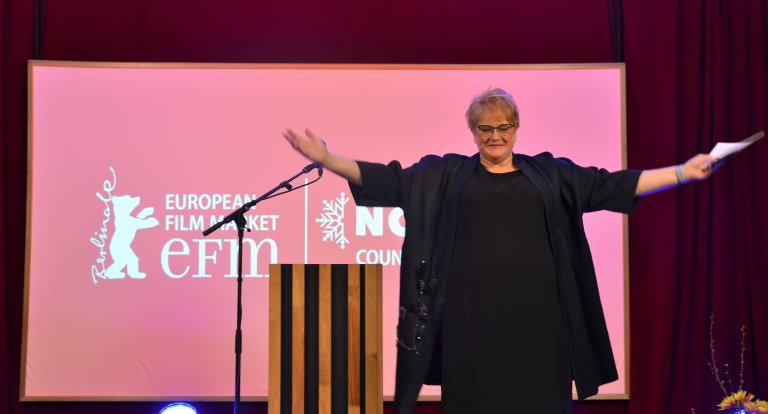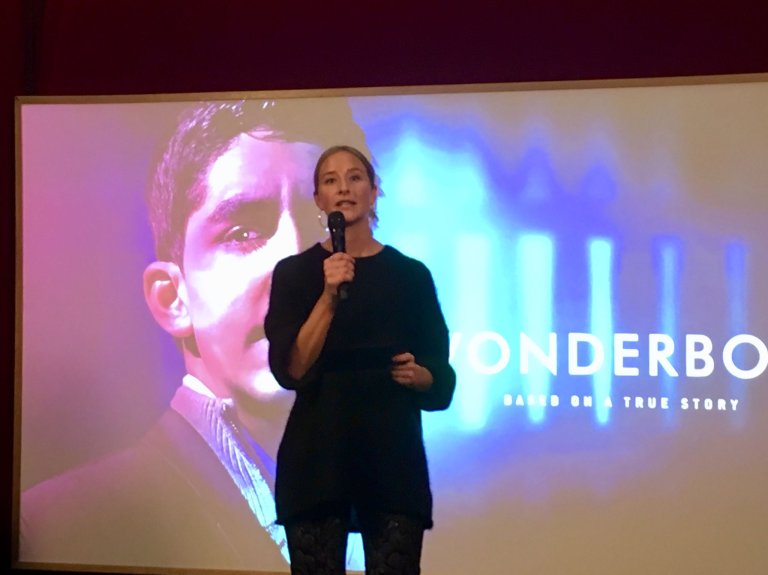Focus on Norway in Berlin
Six days, about 30 Norwegian events, 25 Norwegian films and more than a thousand guests in the Norway House during the Berlinale are now history. "We hope and believe that Norway and Norwegian cinema have been noticed in Berlin, and that it will have positive effects for the entire film industry," said managing director Sindre Guldvog, of the Norwegian Film Institute.
Norway, as a third country in the world, was this year the focus country of the European Film Market at the Berlin International Film Festival - one of the world's largest and most important meeting places for the film industry. This was announced during last year's Berlinale, when the agreement was signed by Norwegian Minister of Culture Trine Skei Grande, Guldvog and festival director Dieter Kosslick.
On Friday, 8 February Skei Grande and Guldvog could officially open the Norway House, a meeting place for the Norwegian film industry and for filmmakers and potential new partners - co-producers, distributors, TV channels, buyers of Norwegian products and services for film and television production.

”Proud and happy”
”Finally, the time has come. We are here! In the fantastic Norway House, as the Country in Focus at one of the world's most important film festivals. I am both proud and excited about the opportunity to present and promote all the quality that Norwegian films and Norwegian artists stand for,” said Trine Skei Grande in her welcome.
Sindre Guldvog was pleased with both the Norway House and the Norwegian participation in the festival events and film programme.
”I think most people have learned that Norway has been the focus country during this year's festival, and the interest in the Norway House has been exceptional, with several hundred visitors every day. We hope and believe that this initiative will show concrete results in the long term, both as an increased awareness of the Norwegian film and film industry, increased sales, more co-productions, interest in Norwegian locations from foreign production companies - also that even more people get their eyes on the many good service providers we have in Norway. I am both proud and happy to be Norwegian after these days in Berlin. At the same time I would like to thank all those who have participated in launching this huge event,” Guldvog concluded. - The initiative is now to be evaluated both for implementation, guests and concrete results.
Norway in Focus
The Berlinale’s Focus on Norway is part of the largest Norwegian international cultural initiative ever, where Norway is also Guest and Honor at the Book Fair in Frankfurt in October and partner country during the world's largest jazz fair, Jazzahead, in Bremen in April.
”Why is it so important to get involved in international events in the cultural field? Why are we here today? We are here to show Norwegian quality, and of course to expand the market for Norwegian film and film industry. But we are also here to emphasise the importance of cultural alliances. Art and culture is about freedom of speech - the key to enlightenment. And enlightenment is the key to liberation and freedom,” said Skei Grande.
”This is a fantastic opportunity to present not only Norwegian films and drama series, but also Norwegian locations for shooting films and Norway as a service provider. Norway is rather advanced when it comes to equipment and technology, and it has been important for us to demonstrate here in Berlin,” added Guldvog.
25 Norwegian films in Berlin
During this year's Berlinale, 25 Norwegian films were shown in the official programme, with Hans Petter Molands Out Stealing Horses (Ut og stjæle hester) in the main competition.
Also Rasmus Sivertsen's Louis & Luca – Mission to the Moon (Månelyst i Flåklypa), as well as the short films Dad and She-Pack participate in the Generation KPlus competition and the documentary False Belief in Forum Expanded.
Edith Carlmar's The Wayward Girl (Ung flukt), starring Liv Ullman, unspooled in Berlinale Classics - four Norwegian co-productions and 14 films were shown in the European Film Market.Read more about all the movies here.
Out Stealing Horses had its world premiere on Saturday, 10 February, and received good reviews in the international industry magazines. What many of them highlighted is the beautiful depiction of nature, both in sound and image, and at the press conference after the first screening in Berlin, both director Hans Petter Moland and author Per Petterson and were asked why they had this strong observation of nature, animals and forest. Both replied that they were nature's men, grew up close to it, and that nature plays a central role in the story being told.
The Norway House was also visited by American star producer Gale Ann Hurd, who is credited for such films as Aliens, The Terminator and TV series such as The Walking Dead, who was talking about women in film, in a meeting coorganised by the WIFT-Women in Film and Television) organisation.
Drama Series Days
In addition Norway was strongly represented during the Drama Series Days at Zoo Palast, where two Norwegian series, Clone (Klone) and Hacker, were pitched to an international audience. Under the title Norwegian drama - Staying ahead of the Game, the Norwegian Film Institute presented four drama projects from the New ways talent programme: Ole Giæver's Clone (Klone), Amy Black Ndiayes Verden er min (english title TBA), Jakob Rørvik's Dates in Real Life and Kathrine Valen Zeiner’s Hand Made.
Norway and the film institute were also represented with stand at the European Film Market in Martin Gropius Bau, along with the other Scandinavian countries, and was also active during the InternationalCo-Production Market.
EFM Horizon - part of the Berlinale that focuses on the future, technology and start-ups - also had a strong Norwegian input, including the companies of Drylab, Storyline, Gimpville and White Rabbit. Norwegian director Erik Poppe who talked about how a small film crew use technology to solve tasks that usually require much larger crews. – Six participants in the film institute and Talent Norway's new UP talent programme for woman filmmakers pitched their projects in the Norway House.
Pitcher
One of the UP participants, Norwegian director Ingvild Søderlind, also presented her project Chica_Chile_Norway (Alle utlendinger har lukka gardiner) at the International Co-Production Market.
“It was very interesting to pitch on the Co-Production Market, because we found out that our project has been thoroughly read, people immediately understood what we want to do with it, and the response has been brilliant, especially from France, Germany and the Netherlands, which has a great tradition for this type of film. It is a pleasure to meet producers from all over the world and realise that we speak the same language, and also to get some new impulses other than Norwegian. Concretely it has been useful – we now have a number of new opportunities, we have ways to get the last funding in place, and we have possible contacts for future co-operation. We have also met a number of sales agents, and for these meetings the Co-Production Market is a fantastic place, because it is very well organised, it is organised for informal talks, and suddenly the result is there.”
What did you get out of your Berlinale visit?
“The Berlinale is a fantastic film festival with huge audience participation. When I see the long queues of ordinary Berliners outside the cinemas around town, I am reminded that film is an art form that can reach out to incredibly large audience. It's a great medium! At the same time, participating in the Berlinale film market is an important reminder that one must think of the audiences and that film balances between art and entertainment and must relate to a market. It is exciting to personally experience that realising a film project is much more than just writing and directing a good story. At the same time, the film nerd in me is so happy when we are so many people are together who are concerned about the same thing: that people should sit in a dark room and look at other people on the screen and understand a little more about what it means to be a human being,” said Søderlind.

Focus on Norwegian producers
This year, seven Norwegian filmmakers were selected for Berlinale Talents, and 10 Norwegian producers were presented especially during this year's Berlinale. One of them was Elisabeth Kvithyll.
“I participated first time in the Berlinale Talent Campus seven years ago, right after I graduated from the Norwegian National Film School. To return to this year's Berlinale with Norway as the focus country, and also to be included by the film institute among the ten most exciting Norwegian producers, has been something special,” said Kvithyll.
“Being one of the six UP filmmakers who pitched their projects at the Norway House was a good experience. I presented two different projects, Johan Kaos’ Wonderboy and Ellen Ugelstad’s De godes problem (English title TBA). Since they are both in development, it was a good time to introduce them to both the Norwegian and international industry. Both projects created a great interest.
“With the Norway House in the middle of the festival centre of Potsdamer Platz, I think that we have successfully promoted Norwegin film and the Norwegian film industry. We have a lot to show, and I hope we will have as much to give,” Kvithyll added.
Several of the Norwegian producers talk about great international interest in their projects, and after both the documentary and the UP pitches, several meetings were set up by Norwegian filmmakers and international potential partners. Several companies with stands in the Norway House report of great interest in products and services
“An important goal of being the Berlinale’s Country in Focus is that more people should get their eyes on everything that is made of film and TV series in Norway. We are in a very exciting time for the Norwegian film industry,” concluded managing director of the Norweian Film Institute, Sindre Guldvog.
